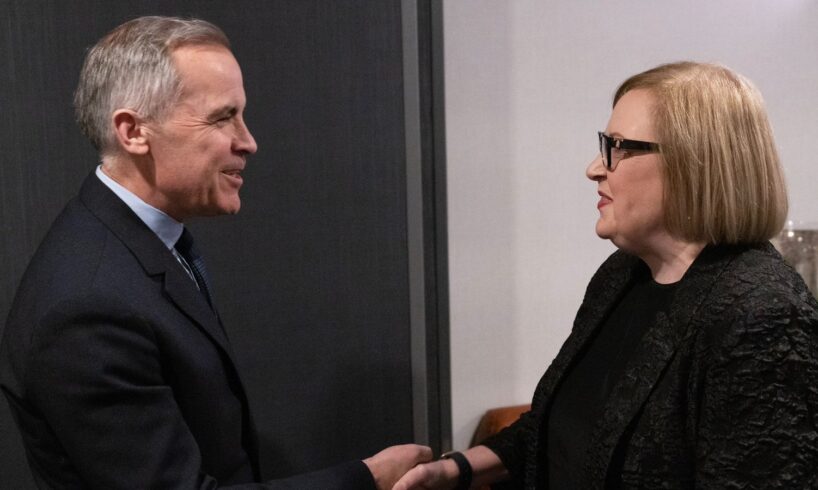
Prime Minister Mark Carney with Unifor President Lana Payne [Photo: Mark Carney]
The response of the Canadian union Unifor to last week’s announcement by transnational auto company Stellantis that it will move production of the new Jeep Compass model—initially slated for its Brampton, Ontario assembly plant—to one of its US facilities further exposes the utter bankruptcy of the union’s reactionary nationalist policies that have steadily decimated the living standards of autoworkers for decades.
The 3,200 assembly workers at the Brampton plant, along with thousands more in the auto parts and supplier network, have been on layoff since early 2024. They were told to expect about an 18-month shutdown while the plant was retooled for the next-generation Jeep Compass. But in February 2025, Stellantis announced that due to “today’s dynamic environment,” retooling would be indefinitely “paused.” The company, which pocketed hundreds of millions in government subsidies, had been contractually obligated to reopen the facility and had floated a mid-2026 restart. Now, even that estimate has been shelved.
Stellantis’ decision comes amid the escalating trade war unleashed by U.S. President Donald Trump’s protectionist, America First tariff regime and follows what Stellantis CEO Antonio Filosa called “very productive talks with the Trump administration.” Stellantis plans to invest $13 billion over four years in its US operations, a redirection financed through job destruction in Canada. UAW President Shawn Fain, one of the most vocal boosters of Trump’s beggar-thy-neighbour tariff policy, issued yet another tribute to the fascist president, hailing Stellantis for “bringing good jobs back to America.” His comments underline the UAW bureaucracy’s full alignment with Trump’s nationalist, anti-worker program, which pits US workers against their class brothers and sisters in Canada, Mexico and internationally. The jobs being “brought back” to America, contrary to Fain’s claims, will not be well-paid and secure. Rather, the massive concessions imposed by the UAW on autoworkers over the past four decades ensure that they will consist of precariously employed and low-paid positions, allowing Stellantis to boost corporate profits at workers’ expense.
The fallout extends well beyond Stellantis. Just on week after the Brampton announcement, General Motors declared Tuesday it will end production at its CAMI Assembly plant in Ingersoll, Ontario, eliminating over 1,000 jobs. The plant was retooled in 2021 at a cost of $2 billion—half of it provided by federal and provincial governments—to build BrightDrop electric delivery vans. Citing “decreased demand,” GM management has now shuttered operations indefinitely. The move, like Stellantis’ decision, is closely tied to Trump’s tariffs and the auto industry’s broader “reshoring” strategy aimed at shifting production to the United States. Jobs for another 200 workers at GM’s Ultium battery facility in Ingersoll remain in limbo.
The impact of the US trade war reaches across key Canadian industries, with tariffs imposed on over $100 billion in annual exports—50 percent on steel and aluminum, 35 percent on semi-finished copper, and 35 percent on any products not in compliance with USMCA trade rules. On Wednesday U.S. based truck manufacturer PACCAR announced the end of production for the American market at its Sainte-Thérèse, Quebec factory, resulting in the axing of 300 workers. A 25 percent tariff on trucks manufactured outside the US is set to begin on November 1. Canadian capitalism, heavily dependent on the US market, is reeling under these collective measures.
Unifor and Carney’s trade-war alliance
What has been the response of Unifor and the Liberal government of Prime Minister Mark Carney? Aside from perfunctory statements of “disappointment,” Unifor President Lana Payne—an enthusiastic backer of the Liberals and “Team Canada”—called on Carney to use Canada’s “leverage” to enforce Stellantis’ contractual obligations. Vito Beato, president of Unifor Local 1285 in Brampton and a supporter of right-wing Ontario Premier Doug Ford, denounced the company’s “impersonal” robocall to workers announcing the decision. Federal Industry Minister Mélanie Joly floated vague threats of legal action, while Carney assured reporters that Stellantis might consider “a different model” for Brampton after the conclusion of USMCA (US-Canada-Mexico trade pact) negotiations. He even suggested some Brampton workers could “relocate” to Stellantis’ Windsor, Ontario assembly plant—four hours away—to fill vacancies there, with plans for a third shift to resume in 2026 after years of reduced operation and long-term layoffs.
For Unifor, the Canadian Labour Congress (CLC), and the entire corporate-political establishment, tariffs are acceptable only when wielded on behalf of Canadian capital. “We cannot surrender the future of EV production to overseas automakers,” Payne recently insisted. A 100 percent tariff on lower-priced and better engineered Chinese EVs and 25 percent duties on Chinese steel and aluminum are thus defended as patriotic “industrial strategy.” The tariffs on China dovetail with a Trump-Carney agreement to weaken China while massively increasing military expenditures for a future war.
In a particularly bombastic statement, Payne remarked, “We can’t allow Trump to pit province against province, sector against sector and worker against worker. We need to stand together and hold the company accountable.” What balderdash! The entire approach to the union’s relations with the auto bosses has been an unabashed embrace of pitting Canadian workers against their counterparts in the American and Mexican auto industry. That nationalist policy, entrenched in the 1985 split of the continent-wide United Auto Workers (UAW) into competing Canadian and American contingents, remains the centerpiece of the auto unions on both sides of the border.
The decision in 1985 to abandon any fight against concessions within the UAW and split the unity of North American autoworkers opened the way not just for a whole wave of further concessions in the US. It enabled the Big Three auto companies to increasingly pit Canadian and American workers against each other in a series of “whipsaw” threats to close plants and cut wages. The UAW and the Canadian Auto Workers (the predecessor of Unifor) bureaucrats responded as the loyal junior partners of their “own” auto bosses by ever more explicitly pursuing a bidding war at workers’ expense, with each seeking to undercut the other by offering lower labor costs and higher profits to the auto companies in a never-ending race to the bottom. Since then, tens of thousands of auto assembly jobs have been lost in both countries as wages and benefits have been slashed across the board.
On the other hand, conditions for the bureaucrats at the top have never been better. The promotion of foul nationalism has gone hand-in-hand with the development of corporatist relations with the automakers and governments at all levels. The Unifor and UAW apparatuses have increasingly consolidated material interests dependent upon ratcheting up the exploitation of the workers they claim to represent, and drawing on the financial perks, committee positions, and other favours extended to them by the corporate elite and its political spokesmen.
The wave of nationalism and corporatism unleashed by the split is not “ancient history.” In 2023, when for the first time in many decades autoworkers faced nearly simultaneous contract expirations, Unifor officials worked overtime to keep Canadian workers separate from their colleagues at the Detroit Three in the United States. In the United States the UAW also pursued their own nationalist-corporatist perspective. In Canada, this found expression in Payne’s repeated declarations that the union was “charting our own course.” To further impede joint action by US and Canadian workers, Unifor negotiated three-year contracts, thereby decoupling the contract expiration in Canada and the US in years to come. The contracts on both sides of the border continued the massive concessions which had become the order of the day for both the UAW and Unifor.
This nationalist beggar-thy-neighbour approach was succinctly put by both UAW and Unifor officials last month when GM shifted production of the Chevrolet Silverado by a third shift at its Oshawa, Ontario, plant to a facility in Fort Wayne, Indiana. UAW plant bargaining chairman Rich LeTourneau, speaking like a company stooge, nakedly stated, “When the company comes to me to increase volume, I’m not gonna tell them no, either, because it’s job security for my people, and hell, if I can corner the market, I will.’ In response to LeTourneau’s statement, Jeff Gray, president of the Unifor local in Oshawa saw it the same way. Whipsawing jobs is simply a shrewd business decision. “What if we had the opportunity in Canada to increase our volume or get different investments? Of course, we would be after that,” Gray said. Neither official cared to mention the years of wage cuts, speed-up and layoffs that have battered workers at both plants over the years as a direct result of the unions’ reactionary bidding war to “secure” investments and product placements.
GM’s CAMI idling is only the latest product of this decades-long descent. After the plant’s 2017 strike was betrayed by Unifor through the promotion of anti-Mexican chauvinism, the workforce fell by a third. A 2021 contract reopening—pushed through without rank-and-file consultation—gave GM a free hand over staffing and conditions in exchange for vague promises of “job security” tied to EV retooling. Workers endured years of rotating layoffs, shortened shifts, and dependency on food banks. The “green transition” marketed as a lifeline by Unifor, GM, and the federal and Ontario governments has instead brought economic ruin.
At Ford’s Oakville, Ontario, plant, EV production has been delayed until 2027, after workers were told during contract ratification to expect only an eight-month shutdown. The 2023 deal barely passed, with majorities voting “No” in Oakville and among skilled trades. At GM’s St. Catharines propulsion plant, the workforce has been halved, while Stellantis’ promised “full three-shift” operation in Windsor has been postponed to early 2026.
The way forward: International rank-and-file unity against trade war and nationalism
Unifor’s agitation for trade-war reprisals and “Canadian-first” investment incentives is the political mirror of the Carney government’s wooing of Trump. Both represent the same class policy: to protect capitalist profits through tariffs and militarism at the expense of the living standards of the working class. Canadian nationalism is not a defence of workers but a mechanism for subordinating them to the interests of “their own” ruling class.
Workers have no interest in backing either the “elbows up” rhetoric espoused by both the Conservatives’ Pierre Poilievre and the nationalists of the so-called “left.” Nor can any store be laid in Carney’s growing “elbows down” approach to relations with the Trump administration. Whatever Carney does, whether he is supporting the European imperialist powers’ efforts to expand the war against Russia in Ukraine or seeking to negotiate a “new economic and security” deal with the fascist Trump, he is seeking to advance the interests of Canadian imperialism.
Workers cannot fight Trump and all he represents except on the basis of a class struggle program in opposition to all factions of the Canadian bourgeoisie and by forging fighting unity with the working class in the US. Indeed, workers, whether across North America or internationally, cannot defend their jobs and livelihoods amid an unfolding global trade war—one moreover that is part of a developing imperialist world war—by lining up with their “own” ruling class.
The working class in the deeply integrated markets of the United States, Canada and Mexico must chart their own common independent course.
They must join forces in a united movement of the North American working class, through the development of rank-and-file committees, independent of the trade union apparatus, as part of the International Workers Alliance of Rank-and-File Committees (IWA-RFC). These committees will organize opposition to the demands of the ruling class for “sacrifices” in the form of mass job cuts, concessions and the evisceration of public services and social programs. Moreover, opposition to trade war and its ruinous impacts on the working class must be infused with a socialist internationalist program across the globe, key tenets of which are opposition to imperialist war, anti-immigrant chauvinism and the destruction of democratic rights.
Stay informed. Sign up to our Autoworker Newsletter.





